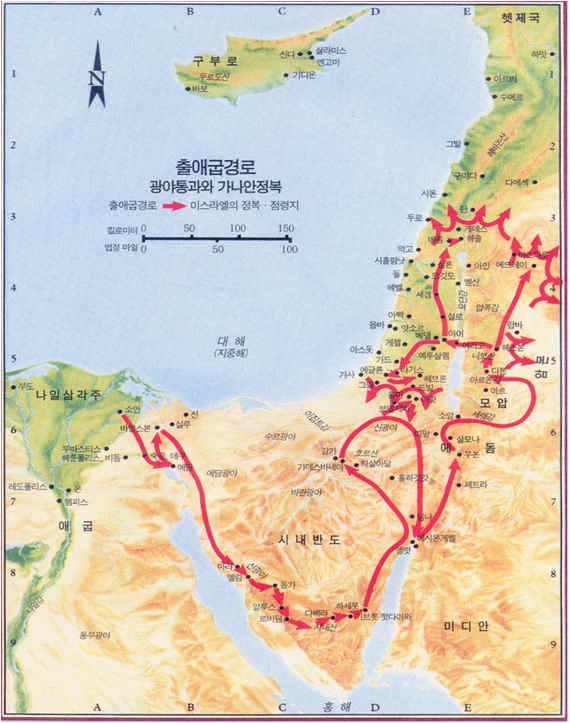+ Blue Letter Bible/KJV + 개역한글 성경구절
글 수 25
2024.5.18 12:37:57

▶ 히브리 사람 Hebrew. [He'brew]
Designation of Abraham and of his descendants. The name is first met with when Lot had been carried away prisoner, one came and told Abram 'the Hebrew.' Gen. 14:13. Hence it is applied to Abraham's descendants through Isaac and Jacob in distinction to the name of Israelites (from the name of Israel given to Jacob), which is their covenant name, the name of promise. It may be remarked how Saul king of Israel had lost the sense of this when he said "Let the Hebrews hear." 1 Sam. 13:3.
(창14:13. 도망한 자가 와서 히브리 사람 아브람에게 고하니 때에 아브람이 아모리 족속 마므레의 상수리 수풀 근처에 거하였더라 마므레는 에스골의 형제요 또 아넬의 형제라 이들은 아브람과 동맹한 자더라
(삼상13:3. 요나단이 게바에 있는 블레셋 사람의 수비대를 치매 블레셋 사람이 이를 들은지라 사울이 온 땅에 나팔을 불어 이르되 히브리 사람들은 들으라 하니
The term occurs in the N.T. only in Acts 6:1 to distinguish the Greek-speaking Jews from those of Palestine, and in 2 Cor. 11:22 and Phil. 3:5 concerning the ancestors of Paul, wherein, to meet the cavilling of the Judaising teachers, he calls himself a Hebrew of the Hebrews, one who had descended without any Gentile or proselyte blood.
(행06:1 그 때에 제자가 더 많아졌는데 헬라파 유대인들이 자기의 과부들이 그 매일 구제에 빠지므로 히브리파 사람을 원망한대
(고후11:22 저희가 히브리인이냐 나도 그러하며 저희가 이스라엘인이냐 나도 그러하며 저희가 아브라함의 씨냐 나도 그러하며
(빌03:5 내가 팔일만에 할례를 받고 이스라엘의 족속이요 베냐민의 지파요 히브리인 중의 히브리인이요 율법으로는 바리새인이요
It is not very clear why Abraham was called a Hebrew. It is generally supposed to be derived from his ancestor Eber or Heber; but it will be seen from Gen. 11:17-26 that there were five generations between Eber and Abraham, so by this derivation many others might have been called Hebrews. Gen. 10:21 says that Shem was "the father of all the children of Eber." This shows that the Hebrews were Shemites, but many other tribes were 'Shemites' that could not be called Hebrews. In scripture the name is not applied to any except to Abraham and his descendants, and only to those who descended through Isaac and Jacob, to the exclusion of the children of Ishmael and Esau. So that there must be some other reason for the name and for its being thus restricted.
(창11:17-26 셈의 후예 셈 아르박삿 셀라 에벨 벨렉 --- 데라 아브람과 나홀과 하란
(창10:21 셈은 에벨 온 자손의 조상이요 야벳의 형이라 그에게도 자녀가 출생하였으니
The root of the word is 'to pass over,' as when one passes over a river, or from one region to another. Abraham was bidden to leave his country and his kindred and to go into the land of Canaan, and the word Hebrew is not employed until Abraham had left his country and was in the land of Canaan. Gen. 14:13. When there he was a 'sojourner,' in a strange country, dwelling in tents. Heb. 11:9. The name was therefore characteristic, and the people of the land could go to Abraham the 'sojourner' and tell him that Lot had been taken prisoner. Joseph when in Egypt said he had been stolen from "the land of the Hebrews." Gen. 40:15. The above characteristic was doubtless subsequently lost, and nothing seen in it but the natural descent from Abraham through Isaac and Jacob; the same persons being mostly called Israelites. The descendants of Ishmael and Esau were not sojourners in the promised land, but wandered whither they would. The name Hebrew does not occur in the O.T. after 1 Samuel except in Jer. 34:9, 14 and once in Jonah 1:9.
(창14:13.
(창11:9. 그러므로 그 이름을 바벨이라 하니 이는 여호와께서 거기서 온 땅의 언어를 혼잡케 하셨음이라 여호와께서 거기서 그들을 온 지면에 흩으셨더라
(창40:15. 나는 히브리 땅에서 끌려온 자요 여기서도 옥에 갇힐 일은 행치 아니하였나이다
(렘34:9, 14 9그 언약은 곧 사람으로 각기 히브리 남녀 노비를 놓아 자유케 하고 그 동족 유다인으로 종을 삼지 못하게 한 것이 14너희 형제 히브리 사람이 네게 팔렸거든 칠년만에 너희는 각기 놓으라 그가 육년을 너를 섬겼은즉 그를 놓아 자유케 할지니라 하였으나 너희 선조가 나를 듣지 아니하며 귀를 기울이지도 아니하였느니라
(욘01:9. 그가 대답하되 나는 히브리 사람이요 바다와 육지를 지으신 하늘의 하나님 여호와를 경외하는 자로라 하고
--- Morrish Bible Dictionary
개역한글KHRV( 120일1독, 1년1독, 권별, 성경통독 )
STUDY - 구절(WESLEY), 단락(MATTHEW), 읽기(Wayne),
Dictionary - Chapter, OT구약, NT신약, 테마별,
(*.62.222.208)
|
.
성경연대표
1.창조
2.족장
3.출애굽
4.광야
5.정복
6.사사
7.통일왕국
8.분열왕국
9.포로
10.포로귀환
11.중간
12.예수
13.초대교회
14.세계선교
관련그림.지도 1.창조
2.족장
3.출애굽
4.광야
5.정복
6.사사
7.통일왕국
8.분열왕국
9.포로
10.포로귀환
11.중간
12.예수
13.초대교회 Ani
1창세기[Genesis] 2출애굽기[Exodus] 3레위기[Leviticus] 4민수기[Numbers] 5신명기[Deuteronomy] 6여호수아[Joshua] 7사사기[Judges] 8룻기[Ruth] 9사무엘상[I Samuel] 10사무엘하[II Samuel] 11열왕기상[I Kings] 12열왕기하[II Kings] 13역대상[I Chronicles] 14역대하[II Chronicles] 15에스라[Ezra] 16느헤미아[Nehemiah] 17에스더[Esther] 18욥기[Job] 19시편[Psalms] 20잠언[Proverbs] 21전도서[Ecclesiastes] 22아가[Song of Solomon] 23이사야[Isaiah] 24예레미야[Jeremiah] 5예레미아애가[Lamentations] 26에스겔[Ezekiel] 27다니엘[Daniel] 28호세아[Hosea] 29요엘[Joel] 30아모스[Amos] 31오바댜[Obadiah] 32요나[Jonah] 33미가[Micah] 34나훔[Nahum] 35하박국[Habakkuk] 36스바냐[Zephaniah] 37학개[Haggai] 38스가랴[Zechariah] 39말라기[Malachi] 40마태복음[Matthew] 41마가복음[Mark] 42누가복음[Luke] 43요한복음[John] 44사도행전[Acts] 45로마서[Romans] 46고린도전서[I Corinthians] 47고린도후서[II Corinthians] 48갈라디아서[Galatians] 49에베소서[Ephesians] 50빌립보서[Philippians] 51골로새서[Colossians] 52데살로니가전서[I Thessalonian] 53데살로니가후서[2 Thessalonian] 54디모데전서[I Timothy] 55디모데후서[II Timothy] 56디도서[Titus] 57빌레몬서[Philemon] 58히브리서[Hebrews] 59야고보서[James] 60베드로전서[I Peter] 61베드로후서[II Peter] 62요한일서[I John] 63요한이서[II John] 64요한삼서[III John] 65유다서[Jude] 66요한계시록[Revelation]

 , 성경권별
, 성경권별 

